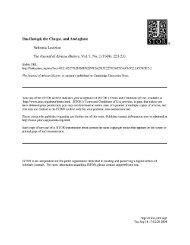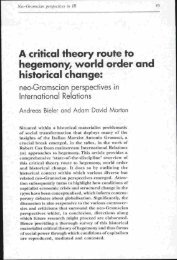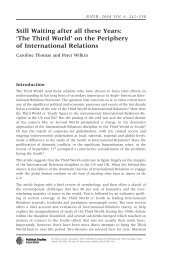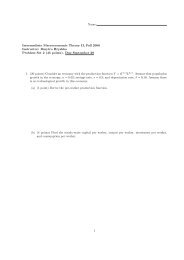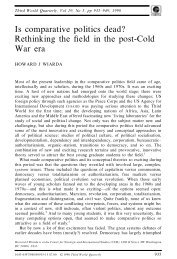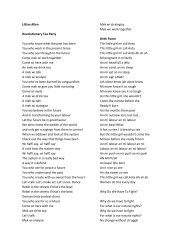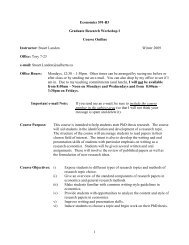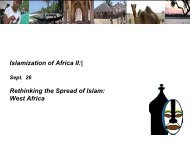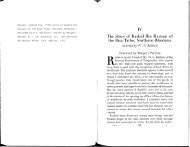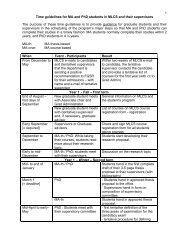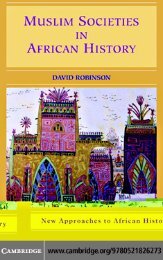2 Ethnocentric Projection and the Study of Kinship
2 Ethnocentric Projection and the Study of Kinship
2 Ethnocentric Projection and the Study of Kinship
Create successful ePaper yourself
Turn your PDF publications into a flip-book with our unique Google optimized e-Paper software.
<strong>Ethnocentric</strong> <strong>Projection</strong> <strong>and</strong> <strong>the</strong> <strong>Study</strong> <strong>of</strong> <strong>Kinship</strong> … May 2008 12<br />
The first <strong>of</strong> <strong>the</strong>se is that <strong>the</strong> very issues that arise in articulating <strong>and</strong> defending <strong>the</strong><br />
<strong>Ethnocentric</strong> <strong>Projection</strong> Thesis also arise in considering variations in <strong>the</strong> forms that kinship<br />
can take on <strong>the</strong> domestic front. Although <strong>the</strong> new kinship studies can be said to focus on<br />
kinship in familiar places <strong>and</strong> spaces, much <strong>the</strong> same dilemma I posed above for proponents<br />
<strong>of</strong> <strong>the</strong> <strong>Ethnocentric</strong> <strong>Projection</strong> Thesis faces anyone exploring “kinship” that departs from<br />
<strong>the</strong> conception <strong>of</strong> kinship that Schneider has identified in traditional kinship studies. At least<br />
that is true if Schneider has, in fact, correctly identified this conception, an assumption<br />
motivating both <strong>the</strong> positive <strong>and</strong> negative str<strong>and</strong>s to <strong>the</strong> new kinship studies depicted in<br />
Table 1. If an asymmetric or distinctive role for biological genealogical <strong>and</strong> reproductive<br />
relations lies at <strong>the</strong> core <strong>of</strong> our (Western) conception <strong>of</strong> kinship, <strong>the</strong>n <strong>the</strong>re is a real question<br />
as to whe<strong>the</strong>r we can explore, in familiar places <strong>and</strong> spaces, something properly called<br />
“kinship” in which biological genealogical <strong>and</strong> reproductive relations do not play such roles.<br />
On <strong>the</strong> o<strong>the</strong>r h<strong>and</strong>, if <strong>the</strong> Western conception <strong>of</strong> kinship is flexible enough to admit <strong>of</strong><br />
kinship between neighbours, between members <strong>of</strong> an internet chat group, or between<br />
disability activists, <strong>the</strong>n it seems that <strong>the</strong> new kinship studies simply extends traditional<br />
kinship studies into novel domestic sites. (And, <strong>of</strong> course, if <strong>the</strong> Western notion <strong>of</strong> kinship<br />
is this flexible, <strong>the</strong>n, one might think, surely it is flexible enough to apply to non-Western<br />
societies lacking our putative fetishization <strong>of</strong> biology. Whence <strong>the</strong> ethnocentric projection)<br />
Thus, <strong>the</strong>re would be much more continuity between <strong>the</strong> new <strong>and</strong> traditional kinship studies<br />
than has been suggested by much <strong>of</strong> <strong>the</strong> rhetoric fueled by Schneider’s own talk <strong>of</strong> <strong>the</strong> end<br />
<strong>of</strong> kinship studies. In effect, we can see something like ethnocentric projection beginning at<br />
home.<br />
The second way in which compartmentalizing <strong>the</strong> discussion <strong>of</strong> Schneider’s critique<br />
from contemporary kinship studies would be a mistake is that one upshot <strong>of</strong> that discussion<br />
is that what I characterized as <strong>the</strong> most central pair <strong>of</strong> claims for <strong>the</strong> new kinship studies—<br />
attention to cultural constructions <strong>of</strong> kinship <strong>and</strong> <strong>the</strong> resulting dismissal <strong>of</strong> biological notions<br />
<strong>of</strong> kinship—prove more difficult to defend than <strong>the</strong>y might initially appear. In particular, we<br />
have seen that <strong>the</strong> negative member <strong>of</strong> this pair, dismissing biological notions <strong>of</strong> kinship, as<br />
it features in <strong>the</strong> <strong>Ethnocentric</strong> <strong>Projection</strong> Thesis, st<strong>and</strong>s in need <strong>of</strong> clarification. When such<br />
clarification is provided, some <strong>of</strong> <strong>the</strong> complexities along <strong>the</strong> path <strong>of</strong> actually defending or<br />
justifying this dismissal are revealed. I have not argued that <strong>the</strong> <strong>Ethnocentric</strong> <strong>Projection</strong><br />
Thesis is false, underscoring this as an empirical issue whose resolution lies beyond my<br />
limited aims in this chapter. But I take <strong>the</strong> preceding discussion to have shifted <strong>the</strong> burden<br />
<strong>of</strong> pro<strong>of</strong> to proponents <strong>of</strong> <strong>the</strong> Thesis, <strong>and</strong> argued that this burden is significant. Since<br />
denying that biological genealogical <strong>and</strong> reproductive relations play an asymmetric or<br />
distinctive role is one way to dismiss biological notions <strong>of</strong> kinship, <strong>the</strong> preceding discussion<br />
again provides grounds for rethinking this aspect to <strong>the</strong> rethinking <strong>of</strong> kinship.<br />
One point made at <strong>the</strong> end <strong>of</strong> section 2 was that <strong>the</strong> positive <strong>and</strong> negative<br />
characterizations <strong>of</strong> <strong>the</strong> new kinship studies were separable. If that is correct, <strong>the</strong>n one<br />
meliorative option for future directions to kinship studies would be to advocate downplaying<br />
those negative features. Doing so, <strong>of</strong> course, would minimize <strong>the</strong> sense <strong>of</strong> discontinuity<br />
between traditional <strong>and</strong> new kinship studies, something that it might be time to do anyway.



